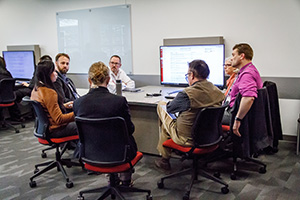Indiana U Expands Active Learning Initiative

Mosaic Faculty Fellows in an active learning classroom (photo courtesy of Indiana University)
Indiana University's Mosaic Active Learning Initiative, a program launched in fall 2015 that supports faculty teaching, research and classroom design for active learning environments, has expanded to five of the institution's regional campus: IU East, IU Kokomo, IU Northwest, IU South Bend and IU Southeast.
The move brings 14 new Mosaic Faculty Fellows into the program. Fellows are "faculty who, over the course of an academic year, teach in Mosaic classrooms, share approaches to active and collaborative learning, engage in research related to active learning classrooms, and contribute to the development of learning spaces across IU," according to a university announcement. The new regional campus fellows are:
- Krista Bailey, sustainability studies, IU South Bend;
- Subir Bandyopadhyay, marketing, IU Northwest;
- Faye Marsha G. Camahalan, education, IU Southeast;
- Steve Dunphy, management, IU Northwest;
- Yu Kay Law, chemistry and informatics, IU East;
- Adam Maksl, journalism, IU Southeast;
- Lance E. Mason, education, IU Kokomo;
- Andrea Meluch, communication studies, IU South Bend;
- Mohammad I. Merhi, decision sciences, IU South Bend;
- Tanya Perkins, English, IU East;
- Susan L. Popham, English, IU Southeast;
- Crystal Shannon, nursing, IU Northwest;
- Joshua B. Tolbert, education, IU East; and
- James M. VanderVeen, sociology and anthropology, IU South Bend.
"It is exciting that we now have more than 50 Mosaic Faculty Fellows across IU, representing a vibrant community of faculty who are committed to active learning approaches in the classroom," said Stacy Morrone, IU associate vice president for learning technologies, in a statement.
Mosaic Faculty Fellows receive a $1,000 stipend for conference travel, research support and other needs; priority scheduling to teach a course in a Mosaic classroom; instructional support; and access to colleagues doing similar work. According to the program website, each fellow is required to:
- Fully participate in the Mosaic Institute, a one-day program focused on exploring active learning strategies in a Mosaic classroom;
- Meet regularly with other Mosaic Fellows to collaborate/provide feedback on teaching, research projects, and recommendations for classroom design;
- Assess student learning to determine the impact of active learning approaches applied in the Mosaic classroom;
- Allow data collection as part of larger university-sponsored studies; and
- Assist with the dissemination of best practices for teaching in Mosaic classrooms.
The goals of the fellows program are to "prepare faculty members to teach in active learning classrooms by exploring a variety of instructional strategies and technologies; build a community of faculty members who collaborate to advance their own teaching and to mentor other colleagues exploring and refining their pedagogical approaches; promote evidence-based teaching by encouraging instructors to study the impacts of new spaces and instructional approaches on student learning; and create faculty leaders who work together and with other stakeholders to guide the development of new learning spaces across the university."
For more information about Mosaic, visit the IU site.
About the Author
Rhea Kelly is editor in chief for Campus Technology, THE Journal, and Spaces4Learning. She can be reached at [email protected].